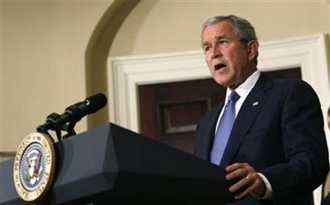 |
 |
 |
 News from Around the Americas | October 2007 News from Around the Americas | October 2007  
Bush Unveils Aid Package for Mexico
 Associated Press Associated Press
go to original


| | President George W. Bush speaks about the Iraq War Supplemental at the White House in Washington October 22, 2007. Bush on Monday asked Congress for $500 million to help Mexico combat the narcotics trade. (Kevin Lamarque/Reuters) |
Washington - President Bush asked Congress on Monday to approve $500 million to help Mexico fight drug trafficking, the first installment of a $1.4 billion aid package for the United States' southern neighbor.

The money was included in a supplemental budget request for the fiscal year that began this month that is primarily aimed at adding funds for the wars in Iraq and Afghanistan. The measure included several unrelated items, such as $724 million for the U.N. peacekeeping mission in Sudan's Darfur region and $106 million to make good on U.S. promises in a nuclear deal with North Korea.

"All of these are urgent priorities of the United States, and the Congress should fund them without delay," Bush said.

The White House took extra care to shine a spotlight on Mexico's portion of the request, with White House press secretary Dana Perino issuing a separate statement about it and Bush calling Mexican President Felipe Calderon to let him know about the money.

Perino said Calderon's "decisive actions" already have begun to bear fruit in the United States, by disrupting drug trafficker supply lines and contributing to cocaine and methamphetamine supply shortages.

"The United States will do all it can to support Mexico's efforts to break the power and impunity of drug organizations and to strengthen Mexico's capabilities to deal with these common threats," she said.

U.S. Ambassador to Mexico Tony Garza called the initiative "a fundamental shift" and "the single most aggressive undertaking ever to combat Mexican drug cartels and the associated violence they pose to citizens in both the U.S. and Mexico."

In a statement, Garza praised Mexican President Felipe Calderon for taking "a courageous stand against the transnational criminals currently threatening Mexico," and noted that "violence related to narco-trafficking has rapidly spread in Mexico."

"The most important action we can take is to partner with President Calderon in his government's struggle against spiraling violence," Garza said.

Bush also asked for $50 million to fight drug trafficking in Central America.

Mexico's Foreign Relations Department is calling the aid plan the "Merida Initiative," after the Mexican city where both leaders discussed the details earlier this year.

Opponents have a different label, however: "Plan Mexico," a snide reference to the Plan Colombia military aid package that has failed to put much of a dent in Colombian cocaine production while raising fears locally about violations of national sovereignty.

Unlike the Colombia initiative, though, the Mexico proposal does not involve putting U.S. troops on Mexican soil.

Instead, it would pay for such things as helicopters and surveillance aircraft, "nonintrusive inspection equipment" and drug-sniffing dogs for Mexican customs, the new federal police and the Mexican military. Other aspects include technical advice and training aimed at cleaning up corrupt police forces and establishing witness-protection programs, the State Department said.

Mexico's Foreign Relation Department said the initiative "will allow both countries to confront more efficiently the common threat of transnational organized crime."

The plan was founded on the basis of "mutual confidence and respect for the sovereignty and jurisdiction of each country," the department added.

Mexican Foreign Relations Secretary Patricia Espinosa brushed aside any suggestion that the United States wanted something in return for the aid, noting "we have a mature and respectful relationship."

Her department stressed that the aid would not come in the form of money, but rather as equipment and training, and said Mexico expected the United States to step up its own efforts against money laundering and weapons trafficking. | 
 | |
 |



